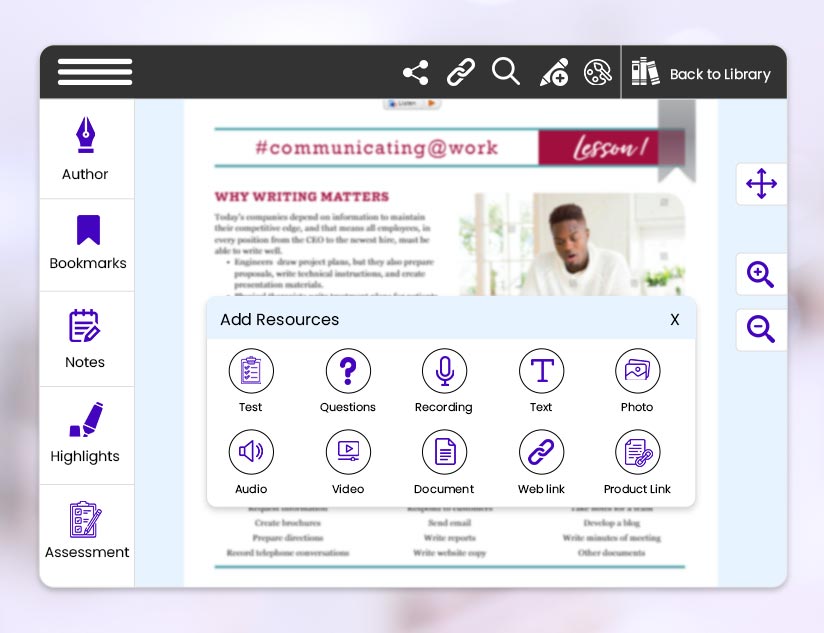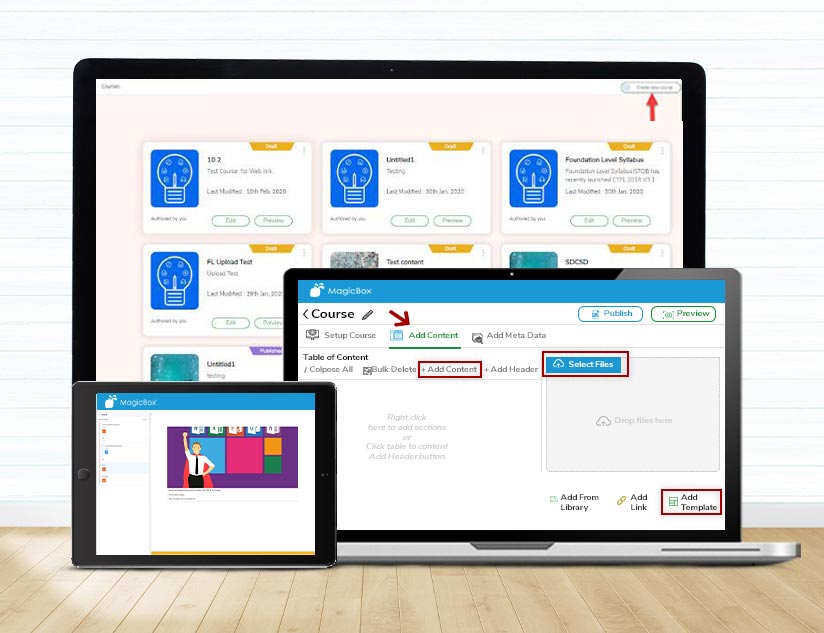AI-Powered Course Creation: Is the Future Here?
May 27th, 2024
The global digital education market is growing exponentially, with expectations that it will reach $240.0 billion by 2034, expanding at a CAGR of 28.3% from 2024. However, high-quality educational content and instructional efficacy are potential restraining factors for the industry to reach its optimal potential. UNESCO says, “The use of artificial intelligence seems an effective way to help teachers find pedagogical solutions.” This highlights the disruptive role of AI in empowering educators to enhance learning outcomes with exceptional course creation, instructional design, and personalization. This blog dives into the disruptive power of AI-powered eLearning authoring tools in transforming course creation and design.
Impact of AI on Course Development
AI has immense potential to transform course creation. Natural language processing (NLP) and natural language generation (NLG) are two sub-technologies of AI that can assist educators in generating content ideas, creating lecture summaries and lesson outlines, or curriculum flows to improve learning outcomes. This, in turn, offers multiple benefits for educators:
Expedite Content Creation
AI-enabled authoring tools facilitate online course creation by recommending the most suitable ways to curate learning materials. Equipped with analytics, these tools offer insightful suggestions for creating micro- and nano-modules and personalized learning journeys for learners at different levels and with varying proficiencies. They also suggest adaptive and assistive techniques to improve the accessibility and inclusivity of the eLearning content.
Streamline Workflows
AI course authoring tools automate a variety of tasks to streamline course development. These include administrative activities, such as scheduling and content planning, content editing, compliance auditing, assessment creation, and feedback.
Tutoring Support
AI learning assistants provide smart support to students in the absence of teachers. They can answer queries and facilitate access to the most relevant learning materials. Conversational learning assistants offer a sense of companionship to students while teachers are unavailable. This is extremely helpful in enabling anytime, anyplace learning on digital learning platforms.
Content Consistency
An understated advantage of AI-powered eLearning course authoring tools is their ability to maintain consistent quality, style, and accuracy. This standardizes the content of the educational institution and frees it of human errors. In digital education, learners and their parents expect high-quality content, which gains even more importance due to the perception of increased distance between students and teachers.
Strategic Advantages of AI-Powered Online Course Creation
AI-powered course authoring has the potential to:
- Enhance course creation efficiency.
- Optimize course creation and distribution costs.
- Enable economies of scale as outreach expands.
- Enable data-driven decisioning for course design.
- Bolster cultural appropriateness of the learning content.
- Facilitate dynamic personalization to improve learning outcomes.
- Heighten the attainment of course-intended learning outcomes (CILOs).
Considerations and Potential Challenges in Online Course Creation
Despite its seemingly endless applications for education, AI is also subject to various concerns, the foremost being algorithmic bias. While AI encourages inclusion, algorithmic or developer bias may skew decision-making toward or against a certain segment of learners. Further, AI relies on ML-based analytics, which requires student data. This raises concerns regarding the privacy and security of this data. The best way to manage privacy concerns is to comply with regional and national regulatory guidelines, such as FERPA, COPPA, GDPR, CCPA, etc. The good news is that AI-powered eLearning authoring tools come with embedded compliance features. The age of rapid evolution demands agility and flexibility in integrating cutting-edge techniques within existing systems. EdTechs must consider API-based course authoring tools and AI learning assistants that can be seamlessly integrated into existing digital learning platforms.
While these are concerns for AI developers, there are certain concerns educators and parents have to take care of. Ensuring the development of social-emotional skills is essential for K12 learners. AI-powered course design can recommend learning tools, such as forum discussions, group projects, etc., to create opportunities for social-emotional learning (SEL). In addition, ensuring that students’ screen time does not reach alarmingly high levels is critical. This calls for intelligent course design with a mix of screen and face-to-face/classroom education.
The Future of Education with AI-Powered Course Creation and Development
The World Economic Forum (WEF) says AI will play a significant role in Education 4.0. While the WEF emphasizes responsible and ethical use of AI, it is certain that integrating the technology can ensure positive outcomes for everyone. The key to successful integration of AI in education is ensuring that AI decisions are explainable, inspectable, and overridable. For this, a collaborative AI-human approach to course design and development is paramount.
MagicBox™’s easy-to-use Content Authoring Platform is an intuitive tool that streamlines content creation while speeding up publishing and distribution. The best part is that the AI-powered tool automatically ensures compliance with both industry standards, such as LTI, WCAG, QTI, etc., but also regulations, such as COPPA, FERPA, and many more. Speak to our experts NOW to learn how this platform can reduce your course creation time by up to 40%.















